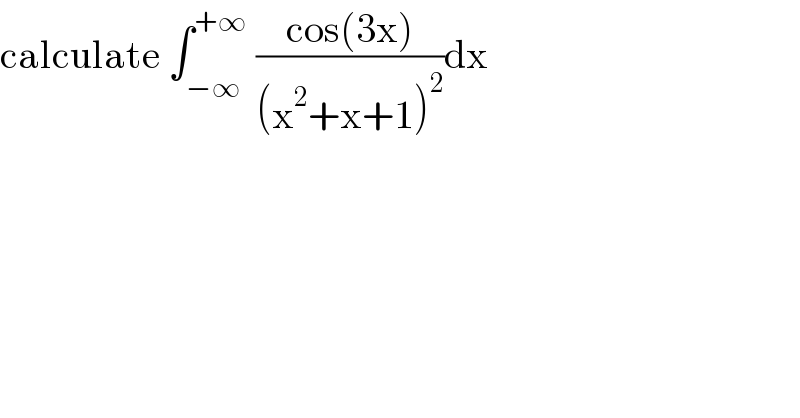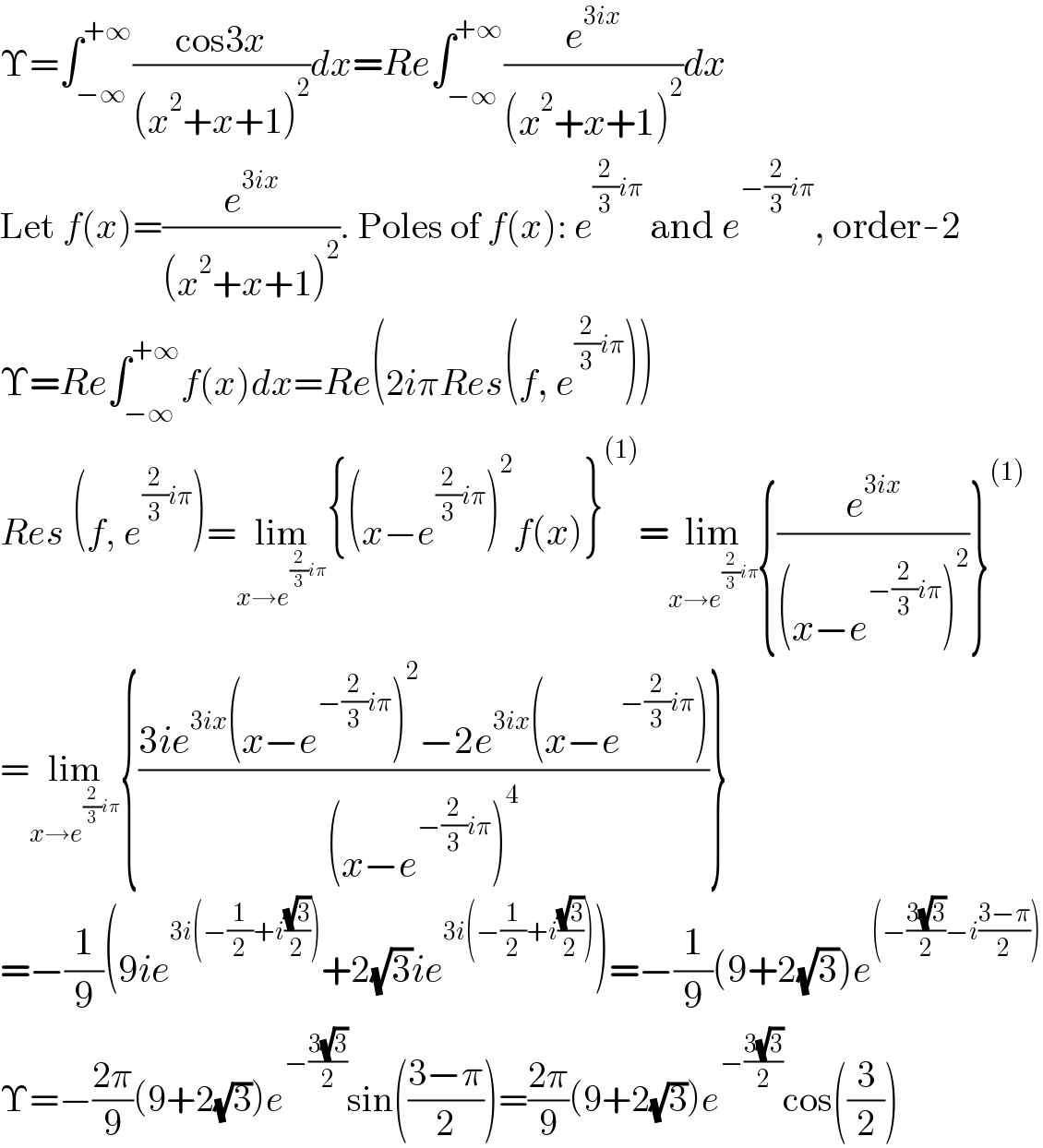Question Number 162016 by mathmax by abdo last updated on 25/Dec/21

$$\mathrm{calculate}\:\int_{−\infty} ^{+\infty} \:\frac{\mathrm{cos}\left(\mathrm{3x}\right)}{\left(\mathrm{x}^{\mathrm{2}} +\mathrm{x}+\mathrm{1}\right)^{\mathrm{2}} }\mathrm{dx} \\ $$
Commented by MJS_new last updated on 25/Dec/21

$$\mathrm{I}\:\mathrm{can}\:\mathrm{solve}\:\mathrm{the}\:\mathrm{indefinite}\:\mathrm{integral}\:\mathrm{but}\:\mathrm{it}'\mathrm{s}\:\mathrm{a} \\ $$$$\mathrm{long}\:\mathrm{hard}\:\mathrm{way}… \\ $$
Commented by mathmax by abdo last updated on 25/Dec/21

$$\mathrm{use}\:\mathrm{residus}\:\mathrm{theorem}\:\mathrm{sir} \\ $$
Answered by Ar Brandon last updated on 24/Mar/22

$$\Upsilon=\int_{−\infty} ^{+\infty} \frac{\mathrm{cos3}{x}}{\left({x}^{\mathrm{2}} +{x}+\mathrm{1}\right)^{\mathrm{2}} }{dx}={Re}\int_{−\infty} ^{+\infty} \frac{{e}^{\mathrm{3}{ix}} }{\left({x}^{\mathrm{2}} +{x}+\mathrm{1}\right)^{\mathrm{2}} }{dx} \\ $$$$\mathrm{Let}\:{f}\left({x}\right)=\frac{{e}^{\mathrm{3}{ix}} }{\left({x}^{\mathrm{2}} +{x}+\mathrm{1}\right)^{\mathrm{2}} }.\:\mathrm{Poles}\:\mathrm{of}\:{f}\left({x}\right):\:{e}^{\frac{\mathrm{2}}{\mathrm{3}}{i}\pi} \:\mathrm{and}\:{e}^{−\frac{\mathrm{2}}{\mathrm{3}}{i}\pi} ,\:\mathrm{order}-\mathrm{2}\:\: \\ $$$$\Upsilon={Re}\int_{−\infty} ^{+\infty} {f}\left({x}\right){dx}={Re}\left(\mathrm{2}{i}\pi{Res}\left({f},\:{e}^{\frac{\mathrm{2}}{\mathrm{3}}{i}\pi} \right)\right) \\ $$$${Res}\:\left({f},\:{e}^{\frac{\mathrm{2}}{\mathrm{3}}{i}\pi} \right)=\underset{{x}\rightarrow{e}^{\frac{\mathrm{2}}{\mathrm{3}}{i}\pi} } {\mathrm{lim}}\left\{\left({x}−{e}^{\frac{\mathrm{2}}{\mathrm{3}}{i}\pi} \right)^{\mathrm{2}} {f}\left({x}\right)\right\}^{\left(\mathrm{1}\right)} =\underset{{x}\rightarrow{e}^{\frac{\mathrm{2}}{\mathrm{3}}{i}\pi} } {\mathrm{lim}}\left\{\frac{{e}^{\mathrm{3}{ix}} }{\left({x}−{e}^{−\frac{\mathrm{2}}{\mathrm{3}}{i}\pi} \right)^{\mathrm{2}} }\right\}^{\left(\mathrm{1}\right)} \\ $$$$=\underset{{x}\rightarrow{e}^{\frac{\mathrm{2}}{\mathrm{3}}{i}\pi} } {\mathrm{lim}}\left\{\frac{\mathrm{3}{ie}^{\mathrm{3}{ix}} \left({x}−{e}^{−\frac{\mathrm{2}}{\mathrm{3}}{i}\pi} \right)^{\mathrm{2}} −\mathrm{2}{e}^{\mathrm{3}{ix}} \left({x}−{e}^{−\frac{\mathrm{2}}{\mathrm{3}}{i}\pi} \right)}{\left({x}−{e}^{−\frac{\mathrm{2}}{\mathrm{3}}{i}\pi} \right)^{\mathrm{4}} }\right\} \\ $$$$=−\frac{\mathrm{1}}{\mathrm{9}}\left(\mathrm{9}{ie}^{\mathrm{3}{i}\left(−\frac{\mathrm{1}}{\mathrm{2}}+{i}\frac{\sqrt{\mathrm{3}}}{\mathrm{2}}\right)} +\mathrm{2}\sqrt{\mathrm{3}}{ie}^{\mathrm{3}{i}\left(−\frac{\mathrm{1}}{\mathrm{2}}+{i}\frac{\sqrt{\mathrm{3}}}{\mathrm{2}}\right)} \right)=−\frac{\mathrm{1}}{\mathrm{9}}\left(\mathrm{9}+\mathrm{2}\sqrt{\mathrm{3}}\right){e}^{\left(−\frac{\mathrm{3}\sqrt{\mathrm{3}}}{\mathrm{2}}−{i}\frac{\mathrm{3}−\pi}{\mathrm{2}}\right)} \\ $$$$\Upsilon=−\frac{\mathrm{2}\pi}{\mathrm{9}}\left(\mathrm{9}+\mathrm{2}\sqrt{\mathrm{3}}\right){e}^{−\frac{\mathrm{3}\sqrt{\mathrm{3}}}{\mathrm{2}}} \mathrm{sin}\left(\frac{\mathrm{3}−\pi}{\mathrm{2}}\right)=\frac{\mathrm{2}\pi}{\mathrm{9}}\left(\mathrm{9}+\mathrm{2}\sqrt{\mathrm{3}}\right){e}^{−\frac{\mathrm{3}\sqrt{\mathrm{3}}}{\mathrm{2}}} \mathrm{cos}\left(\frac{\mathrm{3}}{\mathrm{2}}\right) \\ $$
Commented by Mathspace last updated on 26/Dec/21

$${error}\:{of}\:{calculus}.. \\ $$
Commented by Ar Brandon last updated on 26/Dec/21

$$\mathrm{Thank}\:\mathrm{you}\:\mathrm{for}\:\mathrm{checking},\:\mathrm{Sir}.\:\mathrm{Rectified}! \\ $$
Answered by Mathspace last updated on 26/Dec/21

$$\Psi=\int_{−\infty} ^{+\infty\:} \frac{{cos}\left(\mathrm{3}{x}\right)}{\left({x}^{\mathrm{2}} +{x}+\mathrm{1}\right)^{\mathrm{2}} }{dx}\:\Rightarrow \\ $$$$\Psi={Re}\left(\int_{−\infty} ^{+\infty} \:\frac{{e}^{\mathrm{3}{ix}} }{\left({x}^{\mathrm{2}} +{x}+\mathrm{1}\right)^{\mathrm{2}} }{dx}\right) \\ $$$${let}\:\varphi\left({z}\right)=\frac{{e}^{\mathrm{3}{iz}} }{\left({z}^{\mathrm{2}} +{z}+\mathrm{1}\right)^{\mathrm{2}} }\:{poles}\:{of}\:\varphi? \\ $$$${z}^{\mathrm{2}} \:+{z}+\mathrm{1}=\mathrm{0}\rightarrow\Delta=\mathrm{1}−\mathrm{4}=−\mathrm{3}\:\Rightarrow \\ $$$${z}_{\mathrm{1}} =\frac{−\mathrm{1}+{i}\sqrt{\mathrm{3}}}{\mathrm{2}}={e}^{\frac{{i}\mathrm{2}\pi}{\mathrm{3}}} \\ $$$${z}_{\mathrm{2}} =\frac{−\mathrm{1}−{i}\sqrt{\mathrm{3}}}{\mathrm{2}}={e}^{−\frac{{i}\mathrm{2}\pi}{\mathrm{3}}} \\ $$$${the}\:{poles}\:{are}\:{z}_{{i}} \:\:\left({with}\:{ordre}=\mathrm{2}\right) \\ $$$$\varphi\left({z}\right)=\frac{{e}^{\mathrm{3}{iz}} }{\left({z}−{z}_{\mathrm{1}} \right)^{\mathrm{2}} \left({z}−{z}_{\mathrm{2}} \right)^{\mathrm{2}} } \\ $$$$\int_{−\infty} ^{+\infty} \:\varphi\left({z}\right){dz}=\mathrm{2}{i}\pi{Res}\left(\varphi,{z}_{\mathrm{1}} \right) \\ $$$${Res}\left(\varphi,{z}_{\mathrm{1}} \right)={lim}_{{z}\rightarrow{z}_{\mathrm{1}} } \:\frac{\mathrm{1}}{\left(\mathrm{2}−\mathrm{1}\right)!}\left\{\left({z}−{z}_{\mathrm{1}} \right)^{\mathrm{2}} \varphi\left({z}\right)\right\}^{\left(\mathrm{1}\right)} \\ $$$$={lim}_{{z}\rightarrow{z}_{\mathrm{1}} } \:\:\left\{\frac{{e}^{\mathrm{3}{iz}} }{\left({z}−{z}_{\mathrm{2}} \right)^{\mathrm{2}} }\right\}^{\left(\mathrm{1}\right)} \\ $$$$={lim}_{{z}\rightarrow{z}\mathrm{1}} \:\:\:\frac{\mathrm{3}{ie}^{\mathrm{3}{iz}} \left({z}−{z}_{\mathrm{2}} \right)^{\mathrm{2}} −\mathrm{2}\left({z}−{z}_{\mathrm{2}} \right){e}^{\mathrm{3}{iz}} }{\left({z}−{z}_{\mathrm{2}} \right)^{\mathrm{4}} } \\ $$$$={lim}_{{z}\rightarrow{z}_{\mathrm{1}} } \:\:\:\frac{\left\{\mathrm{3}{i}\left({z}−{z}_{\mathrm{2}} \right)−\mathrm{2}\right\}{e}^{\mathrm{3}{iz}} }{\left({z}−{z}_{\mathrm{2}} \right)^{\mathrm{3}} } \\ $$$$=\frac{\left\{\mathrm{3}{i}\left({z}_{\mathrm{1}} −{z}_{\mathrm{2}} \right)−\mathrm{2}\right\}{e}^{\mathrm{3}{iz}_{\mathrm{1}} } }{\left({z}_{\mathrm{1}} −{z}_{\mathrm{2}} \right)^{\mathrm{3}} } \\ $$$$=\frac{\left\{\mathrm{3}{i}\left({i}\sqrt{\mathrm{3}}\right)−\mathrm{2}\right\}{e}^{\mathrm{3}{i}\left(\frac{−\mathrm{1}+{i}\sqrt{\mathrm{3}}}{\mathrm{2}}\right)} }{\left({i}\sqrt{\mathrm{3}}\right)^{\mathrm{3}} } \\ $$$$=\frac{\left\{−\mathrm{3}\sqrt{\mathrm{3}}−\mathrm{2}\right\}{e}^{−\frac{\mathrm{3}\sqrt{\mathrm{3}}}{\mathrm{2}}} \left\{{cos}\left(\frac{\mathrm{3}}{\mathrm{2}}\right)−{isin}\left(\frac{\mathrm{3}}{\mathrm{2}}\right)\right\}}{−\mathrm{3}{i}\sqrt{\mathrm{3}}} \\ $$$$=\frac{\left\{\mathrm{3}\sqrt{\mathrm{3}}+\mathrm{2}\right\}{e}^{−\frac{\mathrm{3}\sqrt{\mathrm{3}}}{\mathrm{2}}} \left\{{cos}\left(\frac{\mathrm{3}}{\mathrm{2}}\right)−{isin}\left(\frac{\mathrm{3}}{\mathrm{2}}\right)\right\}}{\mathrm{3}{i}\sqrt{\mathrm{3}}} \\ $$$$\int_{−\infty} ^{+\infty} \:\varphi\left({z}\right){dz}=\frac{\mathrm{2}{i}\pi}{\mathrm{3}{i}\sqrt{\mathrm{3}}}\left\{\mathrm{3}\sqrt{\mathrm{3}}+\mathrm{2}\right\}\left(…\right) \\ $$$$\Rightarrow\Psi=\frac{\mathrm{2}\pi}{\mathrm{3}\sqrt{\mathrm{3}}}\left(\mathrm{3}\sqrt{\mathrm{3}}+\mathrm{2}\right){e}^{−\frac{\mathrm{3}\sqrt{\mathrm{3}}}{\mathrm{2}}} {cos}\left(\frac{\mathrm{3}}{\mathrm{2}}\right) \\ $$
